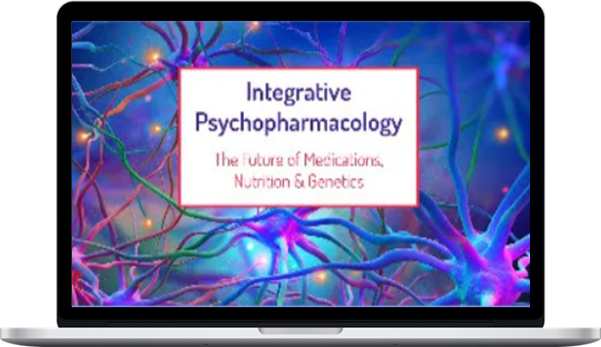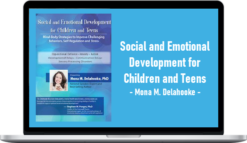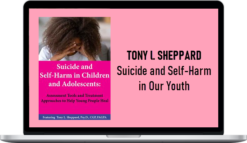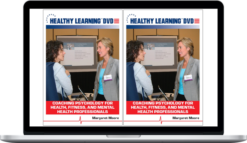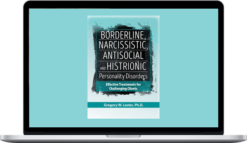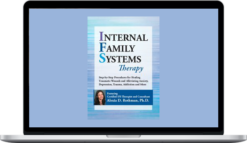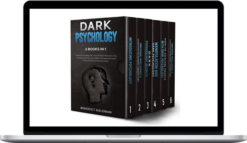Sharon Freeman Clevenger – 2-Day Integrative Psychopharmacology: The Future of Medications, Nutrition and Genetics
$149.00 $62.00
Total Sold: 1
»Instant Delivery
Description
Sharon Freeman Clevenger – 2-Day Integrative Psychopharmacology: The Future of Medications, Nutrition and Genetics
Description Of 2-Day Integrative Psychopharmacology: The Future of Medications, Nutrition and Genetics
Does this sound familiar? Your clients are taking multiple psychotropic medications prescribed by different healthcare professionals, not to mention their use of over-the-counter medications and herbal supplements. You discover that they have no idea who wrote which prescription or why they are even taking the medication. You realize that despite the confusion, you still have a responsibility to know your client’s symptoms, reactions to medications, and to coordinate their care. It’s more critical than ever for healthcare and mental health professionals to understand how psychotropic medications work, where in the body they work, and why they do (or don’t) improve your client’s therapeutic outcomes.
Are you confident in your role as both the client advocate and protector to effectively address medication-assisted treatments in your overall care plan?
Don’t miss the opportunity to spend two-action-packed days learning from expert Sharon M. Freeman Clevenger, MSN, MA, PMHCNS-BC. She will guide you through the newest advances and contemporary trends in blending medication management with nutrition and psychotherapy interventions for anxiety, depression, psychotic disorders and more. You’ll finish this seminar with the knowledge you need to answer clients’ questions, manage side effects, understand medication reactions and improve your treatment outcomes.
What you’ll learn in 2-Day Integrative Psychopharmacology: The Future of Medications, Nutrition and Genetics
Objectives
- Choose psychotropic medications for mood disorders and specific patient characteristics.
- Analyze the actions, therapeutic uses, and side effects of antidepressants.
- Design a plan to assist clients in overcoming barriers that impede the efficacy of their medication regime.
- Determine options for clients with treatment resistant mood disorders
- Categorize the actions, side effects, and therapeutic uses of antipsychotic medications.
- Evaluate the three critical strategies for improving collaboration with prescribing practitioners.
- Propose psychotropic medication treatment options for clients with Attention Deficit/Hyperactivity Disorder.
- Investigate the efficacy of psychotropic medications in treating eating disorders and discuss how to integrate psychotherapy with psychopharmacology for successful treatment outcomes.
- Formulate medication treatment options for substance use disorders and discuss how to effectively incorporate medication assisted treatments into an overall plan for care.
- Analyze the interaction between women’s hormone levels and their mental health symptoms.
- Support the use of complementary and alternative agents for treatment of mental illnesses.
- Determine the unique medication treatment considerations for geriatric clients.
Outline
The Nitty Gritty of Psychopharmacology
- How the brain communicates
- Specifics about nutrition & neurotransmitters
- Gut-brain connection: What it is & does it really exist?
- Over-the-counter medications
- Nutraceuticals
- Vitamins: Differences & effectiveness
- Ancient Medications: Are they still useful?
Genetic Testing: Do’s and Don’ts!
- Do genetic assays help decide medication choices?
- Common genes tested & why
- How to use genetic assays
- Understanding Methylation
- Communicating about genetic testing
- Using genetic testing to predict response & failure
What to Do Before a Diagnosis or Prescription
- Symptoms vs. circuits
- How to identify which brain organ to target
- Using the body to heal itself: Smart nutrition
- Pharmacodynamics vs. pharmacokinetics
- Expected & unexpected interactions: CYPs made simple!
- Off-label medication use & concerns
- Pearls from the Black Box Warnings
Depressive Disorders
- Screening & differential diagnosis
- Integrative approaches: medications, nutraceuticals, herbals
- Types of antidepressants & the pearls & pitfalls of each
- Mild & severe side-effects: How to assess & what to do
- Age-related differences
- Treatment resistance: What it is and how to manage it
- Cutting-edge treatments: What’s new, What’s safe
Anxiety-Related Disorders
- Screening & differential diagnosis
- Brain organs: Targets & triggers
- Integrative approaches: medications, nutraceuticals, herbals
- Choosing gold-standard treatments
- Benzodiazepines: Pearls & problems
- Safely discontinuing benzodiazepines
Mood Disorders
- Screening, stigma & safety concerns
- Types of cyclical disorders: Different types & different treatments
- Types of medications: What to choose & what to avoid
- Monitoring for safety: Labs, age, pregnancy & side-effects
- Managing mild & severe side-effects: Assessment & interventions
- When to augment & what to augment with
Psychosis & Schizophrenia
- Brain targets for treatments
- 1st & 2nd generation anti-psychotics
- Monitoring for safety & severe side-effects
- Assessment & treatment for mild to severe side-effects
- Other uses for anti-psychotics with pearls for prescribing
- Avoiding negative side-effects: Tapering off, switching medications, augmentation
Attentional Disorders
- Neurobiology of cognitive dysfunction
- Screening & differential diagnosis
- The science behind treatment options
- Medication choices: stimulants, non-stimulants, nutraceuticals
Sleep Disorders
- Types of sleep disorders & how to screen
- Differential diagnosis
- Determining what came first
- Treatment options:
- Medications
- Cognitive behavioral therapy
- Integrative approaches: Nutraceuticals, herbals
- Adverse effects & interventions
Substance Use Disorders
- Screening, stigma, diagnosis & differentials
- Abuse vs. addiction
- Helping your client recover from use
- Categories of abusable drugs:
- Caffeine
- Nicotine
- Cannabis vs. CBD
- Alcohol
- Opiates
- Stimulants
- Designer drugs
Putting It All Together
- Resources for prescribers & non-prescribers
- Limitations of the research & associated risks
About Sharon Freeman Clevenger
Sharon Freeman Clevenger, MSN, MA, PMHCNS-BC, CARN, AP, is the founder, psychiatric nurse practitioner, and senior clinical supervisor of the Indiana Center for Cognitive Behavior Therapy in Fort Wayne, Indiana. She has national certification as an Advanced Practice Psychiatric Clinical Nurse Specialist with prescriptive authority, as well as senior level international certification as an Advanced Practice Certified Addiction Nurse through the International Society of Nurses on Addictions. Sharon is former president of NAADAC, the Association for Addiction Professionals.
Sharon has lectured to professional and military/law enforcement audiences worldwide. She has authored more than 50 chapters and articles and has been a guest expert on the TV show, The Doctors. She is the co-editor for both the therapist manual and patient handbook of Overcoming Depression: A Cognitive Behavior Approach (Oxford University Press, 2009), senior editor and author of Living and Surviving in Harm’s Way: The Psychological Treatment Manual for Pre-and Post-Deployment of Military Members (Routledge, 2008), Behind the Badge: A Psychological Treatment Handbook for Law Enforcement Officers (Routledge, 2014), and senior editor and author of Cognitive Behavior Therapy in Nursing Practice (Springer Publishers, 2005).
Sharon has a Master’s degree in Advance Practice Psychiatric Mental Health Nursing from the University of Pennsylvania, and a Master of Arts in Counseling Psychology from the Adler School of Professional Psychology. She is a Doctor of Science candidate in Integrative Healthcare at Huntington University of Health Sciences in Knoxville, TN.
Speaker Disclosures:
Financial: Sharon Freeman Clevenger is the founder and executive director of Indiana Center for Cognitive Behavior Therapy and has an employment relationship with Purdue University Fort Wayne. She receives royalties as a published author. Sharon Freeman Clevenger receives a speaking honorarium from PESI, Inc. She has no relevant financial relationships with ineligible organizations.
Non-financial: Sharon Freeman Clevenger serves on the board of directors for the Alcohol and Drug Abuse Program and The Recovery Center of Fort Wayne, IN. She is a member of the American Nurses Association, the Indiana Nurses Association, and the International Society of Addiction Nursing.
More courses from the same author: Sharon Freeman Clevenger
Delivery Policy
When will I receive my course?
You will receive a link to download your course immediately or within 1 to 21 days. It depends on the product you buy, so please read the short description of the product carefully before making a purchase.
How is my course delivered?
We share courses through Google Drive, so once your order is complete, you'll receive an invitation to view the course in your email.
To avoid any delay in delivery, please provide a Google mail and enter your email address correctly in the Checkout Page.
In case you submit a wrong email address, please contact us to resend the course to the correct email.
How do I check status of my order?
Please log in to HealingCourse account then go to Order Page. You will find all your orders includes number, date, status and total price.
If the status is Processing: Your course is being uploaded. Please be patient and wait for us to complete your order. If your order has multiple courses and one of them has not been updated with the download link, the status of the order is also Processing.
If the status is Completed: Your course is ready for immediate download. Click "VIEW" to view details and download the course.
Where can I find my course?
Once your order is complete, a link to download the course will automatically be sent to your email.
You can also get the download link by logging into your HealingCourse account then going to Downloads Page.
Related products
Total sold: 1
Total sold: 3
Total sold: 1


